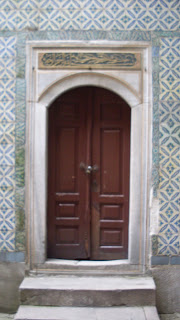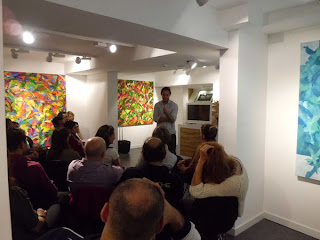Entering the Harem
from the Courtyard of the Black Eunuchs
Visiting the Harem portion of Topkapi Palace was so darn interesting that when I finished I could have gone round again and seen it all and listened to the descriptions all over again. Why? Because visiting the Harem is unlike anything I've experienced. I had as many questions when I left the Harem as when I started.
Keep dreaming, lady.
There's no way you're getting out of this place.
I realized later that one reason I was so intensely interested in the Harem, is the the women enslaved there were like me. When I visit a slavery exhibit in the United States, I have empathy for the slaves, but I don't identify with the slaves because they were people of color. I'm not a person of color so I see the exhibit knowing I could never have been in that position. Here, in the Harem, the slaves were white Christian women (Islam forbids the enslavement of Muslim women). They were people just like me! I'm soooo not okay with that. Here's to a future where no one of any sort is enslaved.
One of the female slaves, Roxelana, a Ukrainian Slav, grew up to marry a Sultan. She was the only concubine in hundred of years of Ottoman history who did. The Sultan nicknamed her "Laughing Roxalena" and at her gravesight there is a sign saying something to the effect, "do not judge Roxalena by today's standards. When she lived, becoming the chief concubine to a Sultan was the most a woman could make of her life." Well I don't judge her, but I have to judge the period. White people in my country were wrong to enslave black Africans and Ottoman culture was wrong to enslave white Christian women too. Turkish people have their own reasons for judging Roxalena
(which is a whole other story).
The initial entry into the Harem.
The tile is so achingly beautiful
it literally took my breath away.
Unlike most slave quarters, the physical space for the Sultan's harem was very beautiful. I am head-over-heels in love with Turkish Iznik tiles and the tile work throughout the Harem was exquisite. So these may be some of the best-looking slave quarters built. Like all apologists for slavery, I read or heard somewhere in this exploration, "these women were probably better off than if they had just lived their normal lives wherever they were born." I don't believe it. It's still slavery, however gilded.
This ceramic tile is famous all over the world.
Turkish Iznik tiles were manufactured
at the height of the Ottoman Empire.
The audioguide explained there was a strict female heirarchy with the Harem with the Sultan's mother described not only as the most powerful lady over all of the others - it sounded like she had quite a bit of power over the Sultan as well. Well gosh, no wonder the Empire declined! Imagine your mother-in-law having a say in running lands from Lebanon to Libya - and she didn't get out of the house much or was was even all that educated.
I tried to think of any female heirarchies that occur naturally, and I couldn't think of any. Can you think of one? Female heirarchy seems unnatural to me.
The pebbled path was for the Sultan's horse
so he wouldn't trip as the Sultan
made his way from his Quarters
through the Harem to the outside world.
The path led to the Black Eunuch's courtyard.

The door to the Black Eunuch's dormitory.
If you don't know what an eunuch is,
you'll have to look it up in the dictionary.
Yes, they really existed. That wasn't an urban legend.
Gorgeous detailing
over the door to the dormitory.
It's magnificent, isn't it?
Here a younger eunuch
is instructed by the Chief Eunuch,
who apparently yielded enormous power.
Topkapi Palace barely grazes the Eunuch's story.
Both their dormitory and their mosque are off-limits
to visitors.
I find their story as fascinating as the harem slaves
and wish Topkapi had shared more about the entire
Palace community, especially the Eunuchs.
I mean, it's not everyday one learn about eunuchs.
Which path should the Sultan take into the Harem?
The Eunuchs were posted around the clock
in this small antechamber
to protect the Harem women.
They used these two facing mirrors
to see down the various passageways
so they were forewarned if someone was coming.
Looking back on the Black Eunuch's courtyard.
Isn't that portico so classic and contemplative?
The path leads to the Sultan's horse mount
outside his own chambers.
This is called the Passageway of the Concubines.
Just like a solitary confinement prison, the prisoners
were not allowed interaction with the guards.
The eunuchs would leave the food for the ladies
on the counters on the left wall and then leave.
This is the Courtyard of the Concubines.
If a women bore the Sultan a son, she hit the big time
and could get a window with a view...onto this courtyard.
Imagining their plight...
what do all prisoners do, but look to the sky.
The harem has many parts that are off-limits to guests. The private quarters of the Valdin Sultan (the Sultan's mother), the Harem hammam, the Eunuch dormitory and mosque, plus the concubine's dormitories. At any one time, the Sultan had 300 concubines. Only one of the Harem's six levels is shown to the public. Why do they charge extra to see this portion of the palace? It lessens the number of visitors. But then, maybe that's the idea.

































 Who links to me?
Who links to me?
